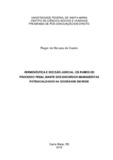| dc.creator | Castro, Roger de Moraes de | |
| dc.date.accessioned | 2020-11-20T11:03:23Z | |
| dc.date.available | 2020-11-20T11:03:23Z | |
| dc.date.issued | 2018-09-26 | |
| dc.identifier.uri | http://repositorio.ufsm.br/handle/1/20155 | |
| dc.description.abstract | The present work aims at treating to what extent the Manichean discourses promoted
by the network society influence the decision making process in the environment of
criminal procedural law considering autonomy itself. This task began with an analysis
of the facets of the criminal process, seeking to ratify the adoption of the accusatory
procedural model by the Constitution. From there, the understanding of criminal
procedural law from the Philosophical Hermeneutics proposed by Gadamer and
worked by Streck. Continuing, the thematic of the society in network, from Castells is
approached. This is justified by the fact that current society has undergone significant
changes, mainly due to the contribution of the Internet and the new means of
Information and Communication Technology, which have substantially changed the
standards of sociability, communication and information. In this scenario, some of the
changes and social manifestations occurring with the proliferation of the internet and
the media are recorded, with the main focus of the theoretical ties of the present
research being the "judgments", the debates on criminal and procedural criminal
matters and the form with which the Judiciary has been seen by society. After the
first chapter, we will understand the autonomy of the law and the judicial judicial
decision constitutionally correct from the armouring made by legal hermeneutics and
the integrative theory of Dworkin, in the sense of the application of law as integrity
and coherence. In the face of this, one will seek to ascertain the democratic meaning
of a judicial decision handed down in a process with democratic pretensions.
Understanding the responsibility of judges at the time of criminal procedural
decisions, reflecting on the impossibility and unconstitutionality of judicial decisions
based on elements external to the law, especially in the field of morality, which end
up preying on the law. Finally, it is demonstrated the influence of the Manichean
discourses in the judicial decisions, through some judged ones. | eng |
| dc.language | por | por |
| dc.publisher | Universidade Federal de Santa Maria | por |
| dc.rights | Attribution-NonCommercial-NoDerivatives 4.0 International | * |
| dc.rights.uri | http://creativecommons.org/licenses/by-nc-nd/4.0/ | * |
| dc.subject | Decisão judicial | por |
| dc.subject | Maniqueísmo | por |
| dc.subject | Processo penal | por |
| dc.subject | Sociedade em rede | por |
| dc.subject | Hermenêutica | por |
| dc.subject | Judicial decision | eng |
| dc.subject | Manichaeism | eng |
| dc.subject | Criminal proceedings | eng |
| dc.subject | Networked society | eng |
| dc.subject | Hermeneutics | eng |
| dc.title | Hermenêutica e decisão judicial: os rumos do processo penal diante dos discursos maniqueístas potencializados na sociedade em rede | por |
| dc.type | Dissertação | por |
| dc.description.resumo | O presente trabalho visa investigar em que medida os discursos maniqueístas
potencializados pela sociedade em rede influenciam o processo de tomada de
decisão no ambiente do direito processual penal, considerando a própria autonomia
deste. Essa tarefa se iniciou com uma análise das facetas do processo penal,
buscando ratificar a adoção do modelo processual acusatório pela Constituição. A
partir daí, a compreensão do direito processual penal se deu com base na
Hermenêutica Filosófica proposta por Gadamer e trabalhada por Streck, abordandose,
também, a temática da sociedade em rede a partir dos estudos de Castells. Isso
se justifica na medida em que a sociedade atual passou por significativas mudanças,
sobretudo com o aporte da internet e dos novos meios de Tecnologia de Informação
e Comunicação, os quais alteraram substancialmente os padrões de sociabilidade,
comunicação e informação. Nesse cenário, registram-se algumas das modificações
e manifestações sociais ocorridas com a proliferação da internet e da mídia, tendo
os “julgamentos” como foco principal da amarração teórica: os debates existentes a
respeito das questões penais e processuais penais e a forma com que o Poder
Judiciário vem sendo visto pela sociedade. Finalizado o primeiro capítulo, passa-se
a compreender a autonomia do direito e a decisão judicial penal constitucionalmente
correta a partir da blindagem feita pela hermenêutica jurídica e da teoria integrativa
de Dworkin, no sentido da aplicação do direito como integridade e coerência. Frente
a isso, buscar-se-á perquirir o significado democrático de uma decisão judicial
proferida em um processo com pretensões democráticas, compreendendo a
responsabilidade dos juízes no momento das decisões processuais penais, sendo
feita uma reflexão acerca da impossibilidade e inconstitucionalidade de decisões
judiciais fundamentadas a partir de elementos externos ao direito, especialmente no
campo da moral, cujos elementos acabam por predar o direito. Por fim, demonstrase
a influência dos discursos maniqueístas nas decisões judiciais, através de alguns
julgados. | por |
| dc.contributor.advisor1 | Isaia, Cristiano Becker | |
| dc.contributor.advisor1Lattes | http://lattes.cnpq.br/1677439477708820 | por |
| dc.contributor.referee1 | Nascimento, Valéria Ribas do | |
| dc.contributor.referee1Lattes | http://lattes.cnpq.br/6294253776126361 | por |
| dc.contributor.referee2 | Garcia, Jaci Rene Costa | |
| dc.contributor.referee2Lattes | http://lattes.cnpq.br/0476317427421646 | por |
| dc.creator.Lattes | http://lattes.cnpq.br/5448999638541096 | por |
| dc.publisher.country | Brasil | por |
| dc.publisher.department | Direito | por |
| dc.publisher.initials | UFSM | por |
| dc.publisher.program | Programa de Pós-Graduação em Direito | por |
| dc.subject.cnpq | CNPQ::CIENCIAS SOCIAIS APLICADAS::DIREITO | por |
| dc.publisher.unidade | Centro de Ciências Sociais e Humanas | por |



